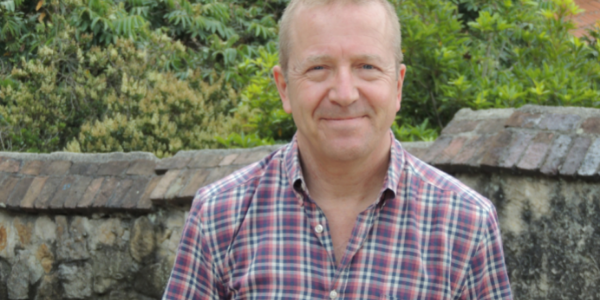“I hope I have contributed in some small way” : Peter Grav reflects on a twenty-year-long career at the Graduate Centre for Academic Communication

Peter Grav has spent the last twenty years of his career teaching graduate students how to advance and refine their arguments – in writing. Now those two decades of teaching and mentoring are coming to a close as he retires from the School of Graduate Studies.
As an Associate Professor (teaching stream) and full-time faculty member at the Graduate Centre for Academic Communication (GCAC), Peter has taught hundreds of students how to plan, structure, write, and revise research articles, grant proposals, and oral presentations. He’s had an unconventional road into the academy, having pursued a career as an electronics salesman before attending university in his mid-thirties. But persuasion and patience, gained from that first profession, have come in handy. “By the time students enter graduate study, they’re expected to know writing in a variety of genres and argumentation at a sophisticated level,” says Peter. “But it takes time to learn those skills, especially if English is your second, third, or even fourth language.”
“I feel like I made a difference,” he says of his time at the GCAC, where he started as a teaching assistant in 2001. “It was tangible. Ultimately, what I’m proudest of is helping people who are doing extremely important work. I hope I have contributed in some small way to the dissemination of all the brilliant research that goes on at U of T – be it in Engineering, Art History, or Epidemiology.”
Over the course of his decades-long career, Grav has been responsible for some of the GCAC’s most popular courses and curricular innovations. “Understanding the Research Article,” a course he created early on in his tenure, continues to be a mainstay of the GCAC’s offerings. In fall 2021, the Centre’s symposium for international graduate students, which Grav has co-taught for a number of years with his long-time colleague Rachael Cayley, had 198 registrants. And for many years now he has run the popular “Research Article Bootcamp,” a two-day opportunity that offers graduate students blocks of dedicated time to do the one thing they really need to do – write.
His colleagues are quick to remark on his deep commitment to his craft and his students. “He is someone who really enjoys the company of his students and goes the extra mile for them,” says Dr. Jane Freeman, who as Director of the Graduate Centre for Academic Communication, has worked alongside Grav for the duration of his career at SGS. That extra mile involved extensive research into citation practices in different disciplines that aimed to understand how authority was established through paraphrasing and direct quotations. Grav has also published research articles on teaching academic writing to students who speak English as a first language and to students who speak English as a second or other language. But what he’s most proud of is the book he published in 2008 with Routledge – Shakespeare and the Economic Imperative: “What’s aught but as ‘tis valued?”
Dr. Rachael Cayley, an Associate Professor in the teaching stream and Grav’s long-time colleague, says she has always admired his work ethic. “He has never stopped working on becoming a better teacher,” she shares. “His vocation as a teacher is central to who he is. I think our students will miss him greatly.”
Grav admits the leaving is bittersweet. “This is a bit of a COVID retirement, in that we all have lost so much time,” he says. “But there’s so much more to do.” Once travel restrictions are lifted, he’s looking forward to travelling again, to South America, Southeast Asia, Europe – everywhere. And of course, on the bedside table, there are many books to be read.
But before all that, he’s off to change a few more careers. Today he will be teaching students about delivering compelling oral presentations, a necessary skill, but perhaps not one that’s easily mastered. Is this a class he enjoys? “Oh yes,” he laughs. “I’m saving the world from bad PowerPoint presentations – one student at a time.”
